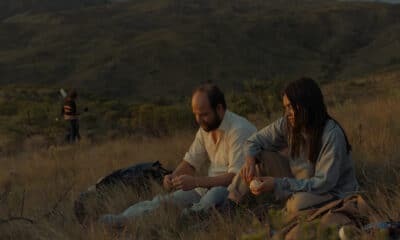Director: John Alexander
Screenplay: Andrew Davies
Starring: Gabriel Byrne, Michael Gambon, Geraldine Somerville, Aisling Franciosi, Nick Dunning
The BBC have taken some gambles on high profile detective dramas over the past few years. There was Zen with Rufus Sewell set in sumptuous Italy and Kenneth Branagh’s Wallander in a Sweden of buttery fields and bleak coastlines. The former died on its perfectly-formed backside and the latter took off but its star has a busy schedule. An initially unpromising setting of gloomy 1950s Dublin is the latest stalking ground for Quirke with Gabriel Byrne, and on this evidence there are the makings of a compelling saga with a few chunks of mystery thrown in for good measure.
Based on the books by Benjamin Black, Dr. Quirke is a pathologist, so ideally placed to be in the thick of a case, or at least follow in its aftermath and reawaken it as in tonight’s offering, ‘Christine Falls’. The opening of the tale is somewhat tired – having toasted an outgoing nurse, Quirke just so happens to return to his office at night to find a long-time friend and colleague confiscating a file on a dead girl. Then when her corpse disappears from the morgue his prominent nose immediately smells fish. The girl worked at his wealthy friend’s house and there was a baby involved, status unknown. Heavies intimidate and kill whoever raises suspicion. A clear case of an establishment cover up, so far, so obvious and something we’ve seen many times before.
What sets Quirke apart is the way it slowly builds a collection of characters, taking care to develop its protagonist and the main players before bringing them inexorably together to reveal how the crime occurred. You could argue in numerous examples from Marlowe to Morse that the details of the scenario are incidental and that it’s the personality involved that brings you back page after page or week after week. Quirke goes one better by providing you with a set up where you think you know the answers before losing you in the flawed hero’s backstory and then hitting you with the resolution garnished with a bitter twist. Frequently we get characters that are actually powerful performances by famous actors, the parts they play subject to the forces of a ridiculous script, Luther being at the forefront of this at the Beeb. This time there is a lead who we’ve been given a mature introduction to, who has been steeped in the narrative the way his liver is pickled by the drink – yes he’s another alcoholic with a chequered history, but the gradual way in which his nature is uncovered makes Quirke a nice change of pace to any breakneck comic book theatrics.
Some commentators regard Gabriel Byrne as a bit past it for the role, possibly as his young niece has a crush on him, but this is an unfair assessment. He’s supposed to be her uncle after all and perhaps we’re overaccustomed to seeing leading men under forty. The action shifts between Dublin and Boston USA, territory Byrne knows well from MILLER’S CROSSING (though he was on the flipside of the moral compass there) and he could do this sort of thing in his sleep. Understated but with the air of a man who’s seen his fair share of demons, he is perfect casting. The producers haven’t filled the supporting roles by half measures either. While it doesn’t take a genius to work out Michael Gambon isn’t going to remain the benevolent cameo he first appears, I’m not going to complain about him being around. The confrontation between the two men reeks of quality and this is a thread to be continued over the weeks, something I for one am looking forward to. With Byrne and Gambon in place and Peter Capaldi in charge at Doctor Who, here’s hoping we see the comeback of the older leading man. Geraldine Somerville is a stabilizing presence as Quirke’s confidante and former lover Sarah and Aisling Franciosi makes a decent impression as Quirke’s young charge Phoebe, holding her own against her co-stars.
Adapter Andrew Davies gave us a tepid Dylan Thomas biopic the other week but is on safer ground with this project. Of course there is the obligatory rough sex scene to keep any stray viewers awake, but overall this is a sucessful blend of murky deeds, family intrigue, good direction and strong acting. Having established Quirke, let’s hope his ongoing story of private grief and public inquiry is sustained.
[usr=4] Quirke was broadcast on BBC One on May 25th. It’s based on the novel Christine Falls by Benjamin Black.
Steve is a journalist and comedian who enjoys American movies of the 70s, Amicus horror compendiums, Doctor Who, Twin Peaks, Naomi Watts and sitting down. His short fiction has been published as part of the Iris Wildthyme range from Obverse Books.

3 Comments
Leave a Reply
Leave a Reply
Latest Posts
-


Apple TV
/ 2 hours agoTrailer: André Holland leads Apple’s new limited series, ‘The Big Cigar’
Apple TV+ has released the full trailer for The Big Cigar, a new, six-episode...
By Paul Heath -


Film News
/ 2 hours agoUK trailer, poster and release date for Sundance smash ‘Sasquatch Sunset’
Premiering in the UK at the Sundance London event in June is the brilliant...
By Paul Heath -


Disney+
/ 4 hours agoNew trailer for ‘Becoming Karl Lagerfeld’ with Daniel Brühl
A trailer has landed for the June-released Becoming Karl Lagerfeld, the Disney+/ Hulu series...
By Paul Heath -


Film News
/ 4 hours agoUK release date revealed for Cannes film ‘The Delinquents’
MUBI has announced the release date for The Delinquents, the Cannes Un Certain Regard-premiering...
By Paul Heath













Stella Kuru
Jun 1, 2014 at 5:32 pm
Enjoyed this generally positive review of Quirke, a TV series that requires some attention from its viewing audience. As you say: “What sets Quirke apart is the way it slowly builds a collection of characters…” and I agree! “Slowly” is not always welcome in watching television, but in this case some commitment on our part to the story will be rewarded. One correction: Quirke discovers his brother, Malachy, played by Nick Dunning, in his office at the beginning of the episode–not a colleague, although they ARE colleagues, as it happens… 😉 Thanks for this review. Hope you will review the other episodes as well and, if not, at least watch them!
Pingback: Early Reviews for QUIRKE
Steve Palace
Jun 2, 2014 at 6:00 am
Thanks for that, I watched the second episode and enjoyed it. I preferred the story from last week but the quality is still high and that ending was very powerful.